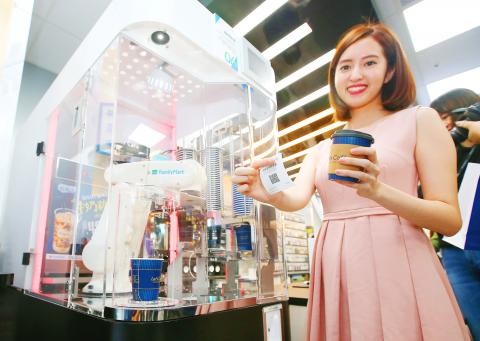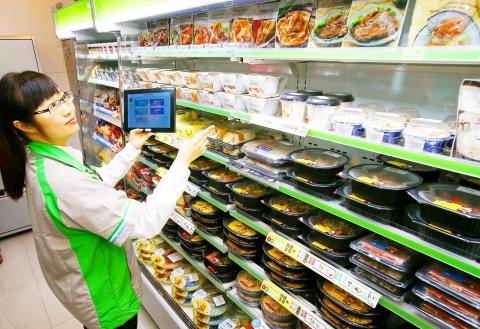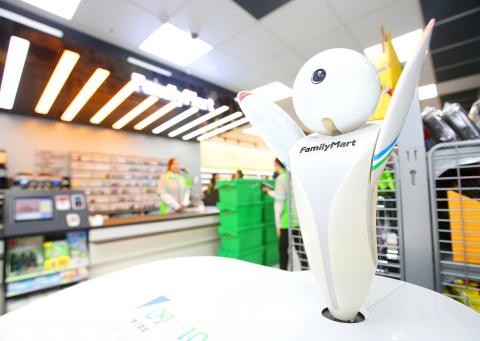Taiwan FamilyMart Co (全家便利商店) on Thursday last week launched a concept store in Taipei on the intersection of Chongqing S Road and Wuchang Street, beginning a field trial that aims to attract customers to the store while reducing the burden on staff by using digital technologies such as robots and blockchain technology.
The new store marks the beginning of Taiwan FamilyMart’s efforts to transform into a next-generation convenience store chain, the Chinese-language Liberty Times (the sister newspaper of the Taipei Times) reported.
In collaboration with Fujitsu Ltd, Microsoft Taiwan Corp (台灣微軟), Plenty Island Taiwan Corp (和椿科技), LWO Technology Co (凌暉科技), BenQ Corp (明基電通) and several other business partners, Taiwan FamilyMart wants to build an open platform where they can receive input from other industries to meet different demands, the newspaper reported.

Photo: CNA
Taiwan FamilyMart operates the nation’s No. 2 convenience store chain, with 3,168 stores as of Feb. 26, the company said on its Web site.
Taiwan FamilyMart said the concept store provides a unique customer experience, which includes a robot to guide customers around the store, a content delivery service and a video communication solution.
The store’s entrance counter is equipped with a 3D camera to count the number of store visitors, while the use of electronic price tags enables consumers to interact with point-of-sale registers while allowing the store to update stock information automatically, it said.

Photo: CNA
The concept store also uses digital technologies — including Internet of Things, big data, artificial intelligence, radio frequency identification, near-field communication and blockchain technology — to lessen staff members’ work burdens, from product ordering and goods receiving to item inspection and display, the newspaper said.
While FamilyMart is not planning to open cashier-free stores in the near future, it would add a self-checkout counter at the concept store in the second half of this year, the company said.
The company on Thursday reported a net profit of NT$1.41 billion (US$48.4 million) for last year, up 2.19 percent from the previous year, with record-high earnings per share of NT$6.3.

Photo: CNA
Consolidated revenue increased 6.38 percent annually from NT$60.57 billion to NT$64.43 billion, thanks to a better product portfolio and contributions from e-logistics businesses, the company said.
The company’s board has approved a cash dividend of NT$5.5 per share, equivalent to a payout ratio of 87.3 percent and a yield of 3.21 percent in terms of its closing share price of NT$171.5 on Saturday.

ADVANCED: Previously, Taiwanese chip companies were restricted from building overseas fabs with technology less than two generations behind domestic factories Taiwan Semiconductor Manufacturing Co (TSMC, 台積電), a major chip supplier to Nvidia Corp, would no longer be restricted from investing in next-generation 2-nanometer chip production in the US, the Ministry of Economic Affairs said yesterday. However, the ministry added that the world’s biggest contract chipmaker would not be making any reckless decisions, given the weight of its up to US$30 billion investment. To safeguard Taiwan’s chip technology advantages, the government has barred local chipmakers from making chips using more advanced technologies at their overseas factories, in China particularly. Chipmakers were previously only allowed to produce chips using less advanced technologies, specifically

BRAVE NEW WORLD: Nvidia believes that AI would fuel a new industrial revolution and would ‘do whatever we can’ to guide US AI policy, CEO Jensen Huang said Nvidia Corp cofounder and chief executive officer Jensen Huang (黃仁勳) on Tuesday said he is ready to meet US president-elect Donald Trump and offer his help to the incoming administration. “I’d be delighted to go see him and congratulate him, and do whatever we can to make this administration succeed,” Huang said in an interview with Bloomberg Television, adding that he has not been invited to visit Trump’s home base at Mar-a-Lago in Florida yet. As head of the world’s most valuable chipmaker, Huang has an opportunity to help steer the administration’s artificial intelligence (AI) policy at a moment of rapid change.

TARIFF SURGE: The strong performance could be attributed to the growing artificial intelligence device market and mass orders ahead of potential US tariffs, analysts said The combined revenue of companies listed on the Taiwan Stock Exchange and the Taipei Exchange for the whole of last year totaled NT$44.66 trillion (US$1.35 trillion), up 12.8 percent year-on-year and hit a record high, data compiled by investment consulting firm CMoney showed on Saturday. The result came after listed firms reported a 23.92 percent annual increase in combined revenue for last month at NT$4.1 trillion, the second-highest for the month of December on record, and posted a 15.63 percent rise in combined revenue for the December quarter at NT$12.25 billion, the highest quarterly figure ever, the data showed. Analysts attributed the

Taiwan Semiconductor Manufacturing Co’s (TSMC, 台積電) quarterly sales topped estimates, reinforcing investor hopes that the torrid pace of artificial intelligence (AI) hardware spending would extend into this year. The go-to chipmaker for Nvidia Corp and Apple Inc reported a 39 percent rise in December-quarter revenue to NT$868.5 billion (US$26.35 billion), based on calculations from monthly disclosures. That compared with an average estimate of NT$854.7 billion. The strong showing from Taiwan’s largest company bolsters expectations that big tech companies from Alphabet Inc to Microsoft Corp would continue to build and upgrade datacenters at a rapid clip to propel AI development. Growth accelerated for